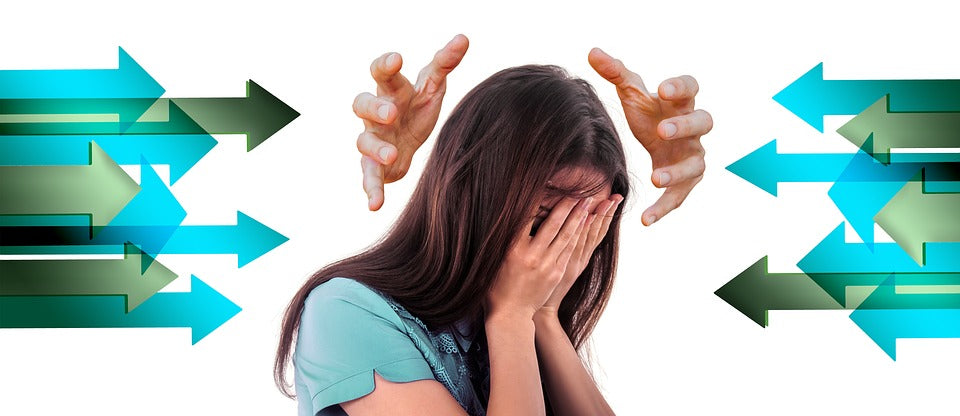Headaches are a very common ailment; they come in many forms and are linked to many conditions. It is often difficult to pinpoint the exact area where the pain originates from, as it can be disorientating. They can be caused by primary or secondary conditions.
Primary condition headaches include migraines, cluster headaches and tension headaches. Secondary headaches are due to underlying conditions such as an infected tooth, a concussion or encephalitis.
To know the cause and proceed with the correct treatment, we first need to identify the type of headache.
Migraines
Commonly experienced as an intense throbbing on one side of the head, it is one of the severely painful types. It usually presents as a cluster headache behind the eye, but then spreads to a larger area. Light and sound can be disturbing and exacerbate the symptoms. A third of patients who experience migraines can tell that it is coming as they suffer partial vision loss or flickering spots. The pain may become severe enough to induce nausea and vomiting. Most people who suffer from migraines get them regularly, they may last a few hours or a few days.
To this day, migraines are still misunderstood, but they are often linked to stress, or certain food types.
It is recommended that you stay away from caffeine and high sugar content products during a migraine. Take electrolytes and fluids to keep your brain hydrated. Pain medications can be taken, and it is usually best to sleep it off in a dark room without noise.
If you have recurring migraines, it might be helpful to visit your doctor to rule out possible causes and look into a tailored treatment plan.
Cluster headaches
More common in men than women, this type of headache is localised behind one of the eyes. This is associated with the hypothalamus, a part of the brain.
A widening of the blood vessels to this part of the brain or elevated blood pressure is often the cause. It is also believed that a sudden release of histamine during an allergic reaction could also cause the onset of a cluster headache.
Medicinal over-use or withdrawal
Many medications can cause headaches in various forms. If you are ever experiencing headaches whilst you are using medications or recently stopped using them, be sure to read the added information leaflets for side-effects and warnings. Withdrawal symptoms may subside in a few days or weeks, depending on the medication. If you suspect that an overdose or negative reaction is the cause of your headache, it is strongly advised that you seek medical attention as it may have long-term effects on your body, if left untreated.
Concussion – Brain injury
A sports injury, a fall, whiplash or a plain old bump on the noggin can cause a concussion. This occurs due to the brain rapidly shaking back and forth within the skull. There will be pain if the head collided with anything, but there will also be an internal headache. You may experience an altered mental state, forgetfulness and be off balance. It is recommended that a patient be taken for a medical evaluation if a concussion is suspected as additional dangers of a brain injury / bleed may exist.
Dehydration

Another common cause is dehydration. When you are not taking in enough fluids, your brain itself temporarily loses water mass and pulls away from the skull slightly. Moving around, causes the brain to move around and slightly bumps against the skull, causing a throbbing pain.
To avoid this, make sure to drink at least 250ml of water for every 10kg’s that you weigh, per day. For example, if you weigh 70kg’s, drink seven glasses of water. If you are active or feeling hot on a typical day, try to take in at least one and a half to two times the normal amount.
Headaches due to illness or infection
Headaches can arise due to illness or infection such as a cold or dental issue. Addressing the primary issue will resolve the headache, but it is commonly believed by medical experts that your body may actually heal at a slower rate when you are experiencing pain. Treating one will ultimately relieve the other. This does not mean that you can rely on pain-relievers alone. You will have to get that tooth checked out.
Tension headaches
Often described as the type of headache where it feels like someone is squeezing your head, this is most commonly caused by stress and overexposure to something that requires intense focus. Reading for hours or spending too much time on the computer, or just working too hard, are all common causes.
This pain is often accompanied by neck and back pain as the muscles tend to tense up.
The only real way to rid yourself of this headache is to relax and rest. If you experience them while you are working, make sure to give yourself frequent “breaks”, even if it is just to get up and get a drink of water.
If you find yourself squinting, visit your optometrist for an eye exam, it may be time for a new pair of reading glasses.
Sometimes, it’s just a headache, sometimes it is not
Sometimes, it is just a headache and sometimes it is something that needs more than a pain-reliever and a nap. If you are experiencing regular headaches, consult your doctor. Discuss your lifestyle, eating habits, medications and exercise routine, to rule out possible causes.
We are here for you
Ask the pharmacists at Mopani Pharmacy, if you have any questions about possible medications and their indications or effects.
We can deliver your medication, supplements and other Mopani online shopping, nationwide! More info: mopani.co.za | crossing@mopani.co.za | Tel: 013-755-5500 | WhatsApp: 066-192-1703

